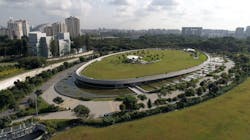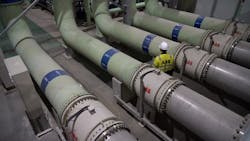Singapore’s first dual-mode desalination plant
Singapore is using desalination as part of the solution to provide enough clean drinking water for its ever-growing population of 5.5 million. Though surrounded by water, having enough drinking water has always been a challenge for this island state. Currently the demand for drinking water is up to 430 million gallons a day. The Keppel Marina East Desalination Plant (KMEDP) is the latest step of Singapore using advanced technology to help address their water challenge.
In operation since June 2021, KMEDP is one of the most advanced desalination plants in the world and one of the first in the world with a dual-mode facility. The plant will produce 30 million gallons of clean water every day, enough to fill seven percent of Singapore’s daily water demand. It has also been designed sustainably in that the treatment facility is underground, freeing up 20,000m2 of green rooftop and community recreation space.
Located at the Marina East area of Singapore, the KMEDP, about twice the size of a football field, can either draw water from the surrounding sea during periods of dry weather or treat water from the Marina Reservoir during periods with heavy rain. With the plant’s dual intakes, when the water level in the reservoir is low, sea water can be pumped into the plant to be desalinated. When the reservoir water levels are high, the plant can treat water from the reservoir. The option to switch to treating reservoir water results in more effective water use, operational flexibility and optimized operational costs, as reservoir water treatment consumes only one-third the energy required for seawater desalination.
The plant is operating with a host of cutting-edge technology from ABB including automation and control systems as well as instrumentation and water analyzers. With ABB’s supply of energy efficient motors, variable speed drives and switchgears, together with process optimization aimed at increasing efficiency, the gains to be realized could potentially help reduce electricity consumption by up to 40 percent. A range of smart sensors and water-monitoring equipment is also being used in the plant.
KMEDP’s plantwide control systems are unified under an ABB Ability™ System 800xA distributed control system, a digital platform that gives engineers wide visibility and precise control from a central command center. The product allows uniformity of procedures and helps improve quality of operational processes. Data is transferred from field instruments to the control system for analysis and diagnostics. With its control system, the plant’s operations can be extended from device to edge to cloud.
KMEDP is operated by Keppel Seghers Pte. Ltd, a subsidiary of Keppel Infrastructure Holdings Pte. Ltd. The Design-Build-Own-Operate project was initiated by Public Utilities Board (PUB), Singapore’s national water agency, which manages the country’s water supply.
KMEDP became the first industrial plant in Singapore to be awarded the highest tier of PUB’s ABC Waters Certification (Gold) in 2019, which recognizes the public area’s creative ecological design and exceptional Active, Beautiful and Clean features. Recently, it was also named “Desalination Plant of the Year” at the Global Water Awards 2021.
SOURCE: ABB

